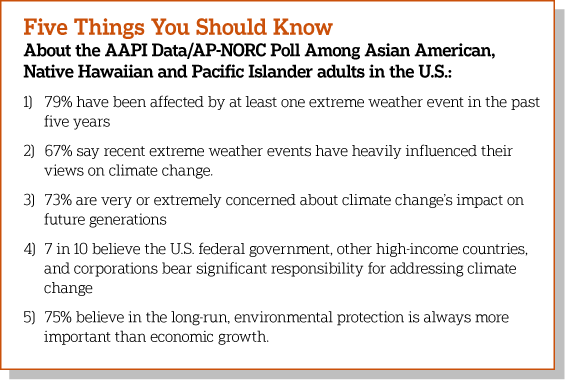
April 17, 2024
As Earth Day approaches and scientists caution that this summer may exceed last year’s record breaking heat, a new AAPI Data/AP-NORC Poll finds that 8 in 10 across Asian American, Native Hawaiian and Pacific Islander (AAPI) communities have experienced various major weather events over the last five years, including extreme heat (59%), severe cold (49%), major droughts (34%), and wildfires (33%).
This extreme weather plays a role in how AAPI adults view climate change, with two-thirds reporting that recent events have influenced their views on the subject. Despite varying experiences with extreme weather, most AAPI adults (84%) believe climate change is happening, a slightly higher share than that of the U.S. population who said the same in September 2023. Of those who believe climate change is happening, three quarters think it is caused entirely or mostly by human activities, while a fifth believe human and natural activities play an equal role. AAPI Democrats are more inclined than AAPI Republicans to acknowledge climate change (94% vs. 68%) and are also more likely to view human activity as the primary cause (86% vs. 52%).
Half of AAPI adults view the science on climate change as more convincing than five years ago, while a third say the science is just as convincing now as it was five years ago. AAPI Democrats are about twice as likely to view climate science as more convincing than AAPI Republicans (66% vs. 34%). Those ages 60 and older are more likely than those ages 18-29 to find the science more convincing (68% vs. 42%). Just about as many, 41% of younger AAPI adults say the science is just as convincing now it was five years ago.
AAPI communities also report higher levels of concern than the general population about climate change’s impacts on various groups. Three-quarters express concern about the impact of climate change on future generations (73%), and about two-thirds are concerned about its impact on coastal communities (63%), while approximately half worry about its impact on low-income people (55%) or on themselves (51%).
Across AAPI communities, 7 in 10 report taking some form of civic action in response to climate change, including 19% who contacted their elected representatives, 32% who volunteered with or donated money to environmental organizations, or 36% who followed environmental organizations on social media. These actions are on par with the general public.
Two thirds of AAPI adults have reduced their use of heat or air conditioning and 43% have reduced the amount of meat they eat, similar to the rates of the general population who have done the same (60% and 37% respectively). AAPI residents in California are even more likely than AAPI adults outside the state to opt for a hybrid car (39% vs 27%) or solar panels (28% vs 11%). However, many who took such actions cite reasons other than environmental concerns like saving money and convenience.
Regarding responsibility for addressing climate change, 7 in 10 AAPI adults believe that the U.S. federal government (73%), developed or high-income countries outside the U.S. (71%), or corporations (69%) have significant responsibility for addressing climate, while far fewer say the same regarding individuals (46%) and developing or low-income countries (43%).
Trust in the Democratic Party is higher than that in the Republican Party for handling climate change (52% vs 7%), environmental issues (52% vs 10%), energy policy (44% vs 15%), and disaster relief (41% vs 12%), but about a quarter trust neither party to address these issues.
Three-quarters of AAPI adults prioritize environmental protection over economic growth over the long-run. While just 25% believe that economic growth is more important than environmental protection. AAPI Republicans (37%) are more likely to prioritize economic growth than AAPI Democrats (13%), though 58% of Republicans still choose the environment.
On specific climate-related policies, there is widespread support among AAPI adults for reducing the amount greenhouse gases companies are allowed to emit (74%) and providing tax credits for solar panel installation (70%). Most also support providing financial incentives for electric vehicles (60%), but fewer favor requiring all new vehicles sold in their state to be electric or hybrid by 2035 (44%).

The nationwide study was conducted by The AP-NORC Center for Public Affairs Research and AAPI Data from March 4-11, 2024, using the Amplify AAPI Monthly survey drawing from NORC’s Amplify AAPI® Panel designed to be representative of the U.S. Asian American, Native Hawaiian, and Pacific Islander household population. Online and telephone interviews were offered in English, the Chinese dialects of Mandarin and Cantonese, Vietnamese, and Korean with 1,005 Asian American, Native Hawaiian, and Pacific Islanders aged 18 and older living in the United States. The margin of sampling error is +/- 4.9 percentage points.






